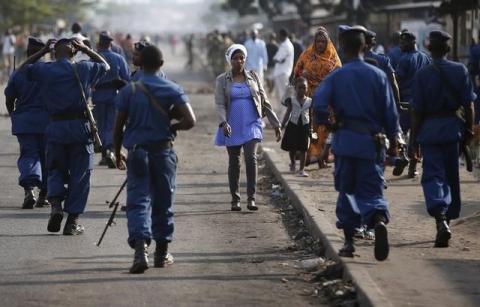Advertisement
UN, AU, EU raise alarm on Burundi crisis spreading
VALLETTA (Reuters) - The United Nations, African Union and European Union warned on Thursday that political division in Burundi threatened to create a deep and violent regional crisis and called on both sides to meet for mediated talks.
"Alarmed by the widening divisions, the threat for many more lives and a deep regional crisis, we pledged to work closely together and to mobilise all our means and instruments to prevent a further deterioration of the situation," senior officials of the three bodies said in a joint statement.
U.N. Deputy Secretary-General Jan Eliasson, who met EU foreign policy chief Federica Mogherini and African Union Commission chair Nkosazana Dlamini Zuma at an EU-Africa summit on Malta, told Reuters that the institutions were not setting deadlines for talks but wanted to "raise the level of concern".
In their statement, they spoke of the "urgency" of a meeting between President Pierre Nkurunziza's government and the opposition, either in Addis Ababa, where the AU is based, or in the Ugandan capital Kampala, where President Yoweri Museveni would chair talks. "No effort can be spared to achieve an end to the violence and to foster a political solution."
PEACEKEEPERS
The statement was released four hours before the U.N. Security Council was due to vote on a French-drafted resolution that would ask U.N. Secretary-General Ban Ki-moon to report back on options for boosting the U.N. presence in Burundi.
Diplomats say Western powers and the United Nations are discussing the possible deployment of peacekeepers to Burundi if violence spirals into a full ethnic conflict.
At least 240 people have been killed and tens of thousands have fled since Nkurunziza decided in April to run for a third term, which he won in a disputed election in July.
Nkurunziza's bid for a new term - which many of his critics say is unconstitutional - plunged the country into crisis, including violent clashes between protesters and security forces in the capital Bujumbura and a series of targeted killings.
The United Nations warned on Monday that Burundi could be facing imminent catastrophe with violence in danger of violence escalating into atrocities. Burundi said it was "not in flames" and dismissed concerns of impending genocide.
Burundi ended a 12-year civil war between Hutu rebels and a Tutsi-led army in 2005. It is the same ethnic divide that led to neighbouring Rwanda's 1994 genocide in which 800,000 people - mainly Tutsis and moderate Hutus - were massacred.
(Editing by Ralph Boulton)



















Add new comment